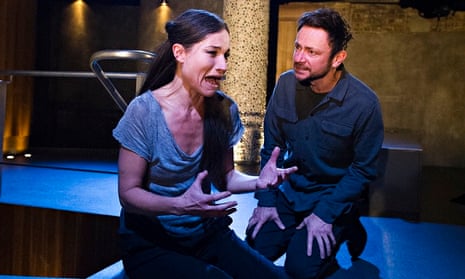Has Homer become our new Shakespeare? Are the ancients our new contemporaries? As the stage increasingly turns to classical Greek writers for echoes of our current torments (see also this week’s premiere of Simon Armitage’s Odyssey), the most common resonance has often seemed vengeance, the locking of generations into feud. This production emphasises two other compelling aspects. The voices of women ring out in a way that is rare on the stage. It is not only that they have good speeches; their experience is the subject. What’s more, this is not a land-locked, insular literature: its experience ranges over Europe.
It was an inspired move to commission Rachel Cusk to deliver a new version of Medea for the Almeida Greeks season. Inspired, because Cusk has written so intimately and ferociously about her own feelings on motherhood and divorce. In doing so, she has attracted almost as much ire as the child-killer Medea. Inspired too, because she is a writer of intricate intelligence: a fact that sometimes gets lost in her voluble intensities. Medea is the hardest of female Greek voices to make coherent, though it is the one most often heard. Is she mad to begin with, or driven mad? If not mad, is she a monster?
For two-thirds of this speedy adaptation, Cusk lasers her way to the centre of Euripides’s drama to come up with a coruscating 21st-century version. A useful lineup of lightly sketched stereotypes provides a background of woe and condescension. A disobliging older woman thinks Medea (Kate Fleetwood) should pull herself together after her husband has scarpered; a chorus of creamily smug young mothers, rocking suitably plastic babies, patronise her. Medea’s Brazilian cleaner says she was always told there is no point in being a woman if you can’t lie. The great Ian MacNeil has designed a sculptural house, which breathes 21st-century wealth and the beginning of a Greek ruin.
At the centre of this is the stinkingly entitled ex-husband, Jason. The scenes between impervious Justin Salinger and Fleetwood contain the most convincing row I have ever heard on stage: every word hurled, yet every word heard. They should be consulted by every exiting partner to learn what not to say. They will be recognised by any woman who thought she was having a conversation with a man, but found he was granting her an interview.
And of course, they would be only half the power without Fleetwood, finding an hour even finer than her Lady Macbeth. Face like a blade, her body not flailing but concentrated in fury, she is like cordite on the stage. It is Cusk’s skill to show both a compendium of grievances and a woman whose grief exceeds them – who cannot be reconciled. This makes her play a true tragedy.
It gets messy towards the end, where Cusk overcomplicates the plot and ducks a major difficulty. Rupert Goold’s direction, tight and fierce early on, also becomes florid: too much colour, too much music, too much repetitive slow motion. But the excitement lives on.

Comments (…)
Sign in or create your Guardian account to join the discussion